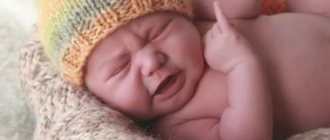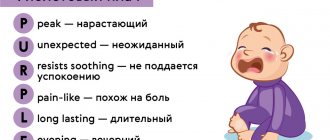Why does a newborn make sounds in his sleep?
During sleep, the newborn breathes irregularly and may make sounds.
And often mothers and fathers notice that the baby’s breathing during sleep is quite irregular, and newborns often make strange sounds, such as sniffling or grunting. In this regard, parents are concerned about questions: what is the baby’s breathing rate that is considered normal and why does he groan, sniffle, and even moan in his sleep?
How does the respiratory system work in babies?
After the birth of a baby, all its organs and systems are only at the stage of full development and it is very important that the baby’s body receives enough oxygen .
Therefore, the infant’s respiratory system is of particular importance, because it provides air flow to all vital systems and organs.
In an infant, the respiratory system does not work the same way as in an adult, since the lower and upper respiratory tracts are still very small and the baby cannot breathe deeply and deeply.
It is for this reason that many parents often observe a frightening picture when a newborn breathes quickly in his sleep, and with the next breath he holds his breath for several seconds . This happens because the baby in the first month of his life does not yet know how to control the respiratory process and for him this pace is the norm.
In the first month of life, a baby still does not know how to breathe properly.
Starting from the second month, the baby's breathing becomes more regular and systematic, since his respiratory system is already more adapted to environmental conditions.
Statistics and reality.
- After 30 years, every fifth person begins to snore, but not everyone notices it. By the age of 65, every second person no longer snores, but snores in their sleep.
- Surveys of married couples have shown that in ten cases out of a hundred, snoring is the cause of complications in the relationship.
- Obstructive sleep apnea (stopping breathing during sleep) is as common as asthma. It affects 2 to 5% of the population.
- Apnea provokes the development and rapid progression of diseases of the cardiovascular system. People who suffer from sleep apnea are 5-8 times more likely to develop hypertension. They have an increased likelihood of stroke and heart attack, and arrhythmia is their constant companion.
- The cause of sudden death during sleep in thirty cases out of a hundred is obstructive and central types of sleep apnea syndrome.
- Chronic lack of sleep, which develops as a result of obstructive sleep apnea, leads to fatal drowsiness while driving. “Secondary sleep” is the cause of 20% of all road accidents in the world.
- Many people suffer from apnea without knowing it, and meanwhile the disease develops. Attention! Symptoms of sleep apnea: restless sleep with frequent awakenings, night sweats, frequent urination at night, daytime lethargy, increased sleepiness, irritability, distracted attention.
- Snoring and apnea. What causes snoring?
- Why is constant snoring at night dangerous?
- How to suspect the disease? Main symptoms...
How to determine your breathing rate
Determining the rate and frequency of breathing of an infant is one of the primary tasks of new parents.
The parents' task is to determine how the baby breathes.
After all, a baby’s breathing is a kind of indicator of the state of his health , and the frequency of inhalations and exhalations can be seen when the baby has problems with this process.
Intermittent rapid breathing in the first month of a newborn's life is normal.
Uneven breathing
Uneven breathing in infants is especially noticeable during sleep . Watching a sleeping baby, inexperienced mothers always think that he does not have enough oxygen or that he begins to choke, as he takes short, frequent breaths.
There is absolutely no reason to panic, because the baby can still breathe exclusively through his nose, and his nasal passages have not yet had time to fully form.
Normal breathing rate
In the first few months of a newborn's life, his breathing rate is fifty to sixty breaths per minute . The following method will help determine whether the baby’s pace is correct: the mother should place her hand on his chest, note the time and count how many inhalations and exhalations her baby made within one minute.
50-60 breaths per minute is the baby's breathing rate in the first months.
If the baby's breathing rate corresponds to the specified norm, then there is no reason for parents to worry. But, if parents notice that his breathing rate is deviated in one direction or another, then it is advisable to consult a pediatrician about this.
A malfunction in a baby’s respiratory system can signal dangerous diseases such as bronchitis or pneumonia, which is why it is so important for parents to control the pace, rhythm and frequency of their breathing, especially during sleep.
Snoring and apnea. What causes snoring?
Snoring is the sound of a physical phenomenon: the soft, flaccid tissues of the larynx vibrate as you inhale and exhale. The weaker the muscle tone, the higher the risk of complete closure of the already narrowed airway.
It is necessary to take into account some anatomical features that cause the occurrence of snoring and sleep apnea. In addition, external factors that reduce muscle tone contribute to the development of apnea.
Anatomical features that provoke narrowing of the airways.
- Congenital or acquired malocclusion. Acquired malocclusion with a backward displacement of the lower jaw, when the upper jaw slightly hangs over the lower jaw. During sleep, the lower jaw moves back, causing the soft tissues to vibrate, cutting off access to air. Quite often, malocclusion develops in those who never parted with a pacifier in childhood.
- Snoring as a result of jaw misalignment occurs in people with a normal bite, but with a tendency of the lower jaw to fall in during sleep.
- Problems with nasal breathing. These include: congenital narrowness of the nasal passages, a deformed nasal septum, polyps, sinusitis and sinusitis, swelling of the nasal mucosa for various reasons.
- Pathology of the development of the uvula. Sometimes it has a congenital abnormal length.
- Pharyngitis, tonsillitis, which led to scarring and persistent enlargement of the tonsils.
- Obesity.
Factors contributing to decreased muscle tone of the larynx.
- Severe fatigue, lack of sleep.
- Intoxication.
- Artificial sleep after taking sleeping pills.
- Heavy smoking.
- Poor thyroid function.
- Menopause, age-related hormonal changes.
- Gerontological processes (aging).
Obstructive sleep apnea syndrome (OSA) is characterized by snoring as well as dangerous obstruction of the upper airway. Due to the cessation of normal ventilation of the lungs, the patient's sleep becomes shallow and restless. Increased sleepiness is observed during the day.
Apnea is a consequence of snoring with obstruction of the airways, but snoring is not always accompanied by obstructive apnea. When snoring, the walls of the larynx can vibrate strongly, but do not collapse. With apnea, they close so tightly that the person wakes up from suffocation.
This is why it is important to differentiate between snoring and apnea. Their treatment is significantly different. Somnological diagnostics will determine which treatment tactics should be used in each individual case. There are effective treatments for snoring.
You can determine whether you have sleep apnea right now by passing a special test.
Why do babies breathe faster when they sleep?
Newborns' rapid breathing while awake may be caused by intense interest in a brightly colored toy or physical activity, such as gymnastics. Why does a baby often breathe in his sleep, when his body seems to be in a relaxed state?
If the baby becomes interested in the toy, his breathing will increase.
Newborn babies cannot breathe fully and deeply, as they have very narrow nasal passages. Therefore, if even microscopic dust particles get into the baby’s nose, then his breathing becomes difficult and rapid.
To prevent mucus and debris from accumulating in your child’s sinuses, you should carefully clean them every day with a cotton swab dipped in baby oil.
Frequent and uneven breathing
If the baby makes wheezing or whistling sounds during rapid breathing, this may be a sign of developing pneumonia or bronchitis .
Parents should also pay attention to the fact that the child can sleep with his mouth open. Sometimes an open mouth during sleep indicates that the baby is hot due to elevated temperature and thus he is trying to restore normal thermoregulation.
A newborn can sleep with his mouth open.
Frequent and uneven breathing of a newborn baby during sleep may be the first sign of bronchial asthma, therefore, with such symptoms, it is necessary to do a full range of examinations and pass the appropriate tests.
Why is constant snoring at night dangerous?
For a long time it was believed that snoring is not dangerous, since it only disturbs others and does not cause any inconvenience to the sleeper himself. It is now known for sure that snoring is a symptom of a dangerous disease. So dangerous that doctors started talking about it. A special branch of medicine has been created - somnology, which studies the causes of sleep apnea and searches for ways to treat them.
The rapid deterioration of a person suffering from sleep apnea is 5 times more likely to cause sudden death from heart attack and stroke.
Often family members and spouses who are annoyed by loud snoring go to sleep in another room. A person suffering from apnea is left alone with his illness. He can wake up suffocating up to 500 times a night! An insufficient amount of oxygen enters the blood and the brain of the sleeping person from time to time gives the body the command to “wake up and breathe.” Having received the appropriate signal, a person moves from the deep phase of sleep to the superficial one - the so-called “awakening” - muscle tone increases, the person takes a deep breath and falls back into deep sleep. In the deep sleep phase, muscle tone drops again and the person once again receives the command to wake up.
Patients with sleep apnea syndrome do not have the necessary duration of deep sleep phases, which over time critically affects their health. During the day, a patient with sleep apnea syndrome cannot concentrate; he looks tired, exhausted, suffers from sweating, and irritability.
If treatment is neglected, other serious diseases develop due to constant night oxygen starvation and chronic sleep deficiency: arrhythmia, cardiovascular dystonia, pre-infarction or pre-stroke condition, cardiac arrest or cerebral hemorrhage may occur.
Reasons why a baby makes various sounds during sleep
Often, parents, standing by the crib of a fallen baby, notice that his calm, serene sleep is interrupted by strange sounds, such as snorting, snoring, grunting and even grunting . Why does a baby make different sounds in his sleep and is this phenomenon considered normal?
A newborn's sleep may be accompanied by snoring or grunting.
If a child moans or cries in his sleep , then perhaps he is trying to throw out the negative emotions that he experienced during the day. But it is also likely that the baby had an unpleasant dream, because it has long been proven that newborns are capable of seeing vivid and realistic dreams.
Snore
Sometimes a newborn makes characteristic sounds in his sleep, reminiscent of snoring or the snorting of an angry hedgehog . This is very worrying and frightening for young parents, but there is no need to worry . Such sounds are caused by vibration of the larynx, which is very soft in infants and can sink into the throat when inhaling.
There is no need to worry about your baby's snoring.
You can stop snoring by gently turning your baby onto his tummy.
Purr
Sounds made by a baby during sleep that resemble the purring or trill of a songbird . A newborn may also smack his lips while sleeping, while smiling and twitching his arms and legs.
The baby may make purring sounds in his sleep and twitch his arms.
This is due to the fact that babies often experience in their sleep exactly the emotions that filled the past day. They see in their dreams how their mother fed them, how she smiled and hummed a lullaby.
Newborn groans
But when a newborn grunts in his sleep , while tucking his legs to his tummy, this may be a signal that the baby is suffering from colic and abdominal cramps. To alleviate these symptoms, you should give your baby special medications that help reduce bloating and reduce pain.
As the child develops, his respiratory system will develop.
The different sounds a baby makes are most often not a cause for concern, so parents should not look for non-existent medications to treat snoring or snorting. When the baby grows up and his respiratory system is fully formed, everything will return to normal.
Causes
Does a newborn groan, toss and turn in his sleep? There are reasons for this. It’s enough to understand them to stop worrying about every frightening sound made by your beloved child.
Adaptation to the environment
When a baby moans in his sleep, there may be different reasons for this. But the very first of them is getting used to a new environment - a different temperature, new sounds and sensations.
Fear can also cause a child to start screaming at night, and the only way a mother can help is to take him in her arms and calm him down. This is the best proof of protection for a little person.
Pathologies and more
It's difficult to fall asleep when something hurts. Most often, infants suffer from colic, which is the result of an incompletely formed digestive system. After a heavy meal, gases begin to torment the small tummy, causing discomfort and pain to the baby. Passing through the intestines, gases look for a way out and this is the period of the main unpleasant sensations. There is no reason to panic, the gases will come out and the baby will fall asleep soundly. You can help him with a light massage on the tummy, helping to remove gases faster.
Teething is not a pathology, but a natural process, but it also causes a lot of pain for both the baby and the parents. The growth of all his organs is rapid, and his teeth are no exception. And it always hurts. During this period, the sleep schedule gets confused, and grunting, moaning and crying are quite natural. The process can be facilitated by special gels that will relieve pain and provide a relaxing rest.
The development of any pathology is already a reason for concern and calling a doctor. Neuralgia or other abnormalities will affect not only the baby’s sleep, but also his behavior during wakefulness. The sooner the problem is identified, the greater the chance that it will be resolved with minimal complications. Almost any problem with the body can provoke inadequate rest.
Emotions
Most often, children born prematurely suffer from anxiety. This is due to the fact that they have not gone through the full intrauterine cycle and are not well prepared to adapt to the new world. If there are no pathologies, then the little one will quickly leave this stage behind and will delight the parents. But until it passes, he will sob and cry in his sleep, and this is normal.
The emotions experienced during the day require an outlet not only for adults. Breasts need this even more.
Other reasons
Restless sleep with moaning and crying can be caused by:
- tight swaddling, when the little one cannot even move;
- an uncomfortable sleeping place when he feels discomfort, but cannot understand its reasons;
- wet diapers, because lying in them is not only unpleasant, but sometimes also painful if there are wounds or rashes;
- overwork, which exhausts the child so much that his sleep cannot go into the resting stage and remains in the fast sleep stage;
- hunger or thirst, which at the initial stage is felt as discomfort and manifests itself in groans and squirming;
- lack of oxygen, which can be caused by both dry and hot air in the room and a tight diaper;
- noises and loud sounds, dissatisfaction with which will be expressed by a groan or sob;
- poor sleep, which is not at all uncommon for such young children, and if adults can distinguish reality from sleep, then this is not yet possible for them.
If the reason for such behavior of the baby is natural, such as emotions, poor rest or hunger, then parents should not worry. It is enough to eliminate it, and the rest of the night will pass peacefully. Emotions are often eliminated with mother's hugs and light kisses. The child feels love and protection, which means he will have no reason to be afraid, and he can sleep soundly next to his mother. Food and water solve the problems of a hungry tummy, as does changing a diaper to make it pleasant to sleep, because lying in wet diapers or your own feces is unpleasant.
A few rules for a peaceful baby's sleep
In order for a newborn baby to sleep peacefully and have only pleasant, vivid dreams, it is advisable for parents to create the most comfortable conditions for him.
- Baby pajamas should be made of natural material and be loose-fitting so as not to hinder the baby’s movements.
- The room in which a newborn sleeps must be regularly ventilated and ensure optimal air humidification .
- The baby's first mattress should be hard and not soft, like a feather bed. In addition, pillows should not be placed in the crib.
- While the baby is sleeping, parents should constantly visit him to check whether the baby has thrown a blanket over his head and whether he is sleeping face down.
- In the first months of life, infants should sleep on their side or back , and not on their tummy. When a baby sleeps on his stomach, his breathing quickens and then the parents think that he begins to suffocate.
The material of pajamas should have a natural composition and not restrict movement.
Does your baby make too many noises at night? 11/28/2016 08:21
Does your baby make too many noises at night?
Is this normal? At an early age (usually up to 6-8 months), the baby makes too many sounds in his sleep. Grunts, squeals, screams, or may even start whimpering during sleep. Babies can even laugh in their sleep. You may also notice excessive movements of your arms and legs.
This is absolutely normal.
When we (adults) are asleep and in REM sleep (during which we dream), our body is completely paralyzed. To prevent us from physically doing what we see in our dreams, impulses from the brain to the nervous system are completely blocked.
In infants this does not work 100%: impulses “break through” during sleep.
When you hear your baby at night, he is usually asleep and dreaming. Typically, by six months (sometimes a little later), babies begin to sleep much more quietly.
The child spends 50% of his sleep in the “active phase”, during which he dreams. Therefore, half the time the baby sleeps quite restlessly.
It can also make sounds during partial awakening: during the transition between sleep cycles. Since the sleep cycle is only 45-60 minutes, your baby can make sounds literally every hour.
A typical mistake: immediately rushing to help.
If you sleep separately, avoid excessive interference at night. Very often, mothers literally jump to help the baby as soon as he squeaks. This is understandable and sometimes at night there is no time to analyze what is happening.
As your baby grows, your task is to teach him to calm himself down during some of the wakings at night: your excessive interference does not work for this task.
Therefore, if possible, pause: do not get up immediately, wait 30-60 seconds. If you hear that the child is really starting to cry, then your help is needed. If he just makes some sounds, whimpers or even bursts into tears, wait a little.
I can't sleep in the same room as my baby.
Sometimes mom and dad can’t even sleep normally in the room with the baby: he sleeps so loudly.
A baby's sleep may seem especially noisy when practicing separate sleeping arrangements. Why - read here.
If you're thinking about moving your baby into a different room, review the safe sleep guidelines for the first year of life.
The following tips may also help you:
When are sounds not normal?
Contact your pediatrician immediately if your child:
My baby is over 12 months old and he still sleeps very noisily.
Many factors can influence restless sleep. You might find this article about confused awakenings helpful.
Source
Does the baby grunt, sniffle and grunt in his sleep? We tell you why this happens
“Babies do make a lot of sounds,” confirms pediatrician Rachel Ouellette. They can generally be unbearably loud with their gurgling, snoring, whistling, hiccups, coughing, yawning, sneezing and grunting.
Newborns are just learning to breathe in the big world outside their mother’s belly, and therefore this process is accompanied by a variety of sounds - from touching to very strange.
It's completely normal if your baby makes strange noises while sleeping.
However, if any of them seem alarming to you, do not forget to discuss this with your pediatrician.
Breathing unevenly
Ouellette notes that babies breathe through their noses, and their breathing rates can be very different from those of adults. While sleeping, a newborn may take 30–40 breaths per minute, while adults typically take only 12–20 breaths per minute.
Don't be alarmed if you suddenly hear a few quick breaths and then a short pause before your baby starts breathing again - this is completely normal and the vast majority of babies stop doing this by six months.
Snores, whistles and snorts
Even during a quiet infant sleep, you can often hear snoring or whistling. “An intermittent whistle may be due to the baby's narrow nasal passage,” Ouellette explains. “But most often it is associated with boogers.”
Most children are born with a stuffy nose (no wonder - they spent nine whole months in amniotic fluid), and therefore snorting, coughing and sneezing help them get rid of excess mucus in the respiratory tract. Also, infant snoring is often associated with too small nostrils, and goes away as the child grows.
Groaning and pushing
Many babies grunt from time to time in their sleep - this may indicate digestive processes. “Most babies grunt as their digestive system works and they learn to poop, pee and pass gas,” says Ouellette.
Grunting doesn't always indicate constipation: "Even if you hear them pushing, it just means they're trying to figure out which muscles they need to use to get the job done."
Other sounds, such as lip smacking or finger and hand sucking, may indicate that the baby is hungry and will soon wake up crying.
In most cases, if a child is healthy, growing, gaining weight, and developing new skills appropriate for their age, strange sleep behavior should not be a concern for parents.











